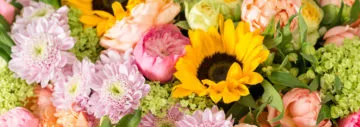
The Poinsettia is NOT A Poisonous PLANT
The widespread belief that poinsettias are poisonous is a misconception. The scientific evidence demonstrating the poinsettia’s safety is ample and well documented. Studies conducted by The Ohio State University in cooperation with the Society of American Florists concluded that no toxicity was evident at experimental ingestion levels far exceeding those likely to occur in a home environment. In fact, the POISINDEX Information Service, the primary information resource used by most poison control centers, states that a 50-pound child would have to ingest over 500 poinsettia bracts to surpass experimental doses. Yet even at this high level, no toxicity was demonstrated.
As with all ornamental plants, poinsettias are not intended for human or animal consumption, and certain individuals may experience an allergic reaction to poinsettias. However, the poinsettia has been demonstrated to be a safe plant. In fact, in 1992, the poinsettia was included on the list of houseplants most helpful in removing pollutants from indoor air. So, not only is the poinsettia a safe and beautiful addition to your holiday decor, it can even help keep your indoor air clean! Now that’s a good roommate!
Holiday Poinsettia Care Poinsettia care begins with proper light, water, and temperature conditions. During the holidays, while in full bloom, they typically enjoy semi-cool, humid locations in bright, indirect light with plenty of moisture. Poinsettia plants should be watered thoroughly; taking care not to drown them by ensuring adequate drainage is available. Likewise, avoid letting them sit in water-filled saucers, which can lead to root rot. Adding plants nearby can help increase humidity levels in dry rooms, as will humidifiers.
Once flower bracts have fallen, you have the option of discarding the plant or keeping it an additional year. For those choosing to continue with poinsettia care, decrease regular watering to allow the plant to dry out some. However, don’t let it dry out completely. Also, relocate the poinsettia plant to a cool, dark area until spring or around April.
 Fertilizing Poinsettias Fertilizing poinsettia plants is never recommended while they’re still in bloom. Fertilize poinsettias only if keeping them after the holiday season. Apply fertilizer every two weeks or once monthly using a complete houseplant fertilizer. Provided the poinsettia plant is given the proper environmental conditions, it should begin to re-grow within weeks.
Fertilizing Poinsettias Fertilizing poinsettia plants is never recommended while they’re still in bloom. Fertilize poinsettias only if keeping them after the holiday season. Apply fertilizer every two weeks or once monthly using a complete houseplant fertilizer. Provided the poinsettia plant is given the proper environmental conditions, it should begin to re-grow within weeks.
Poinsettia Care After the Holidays In spring, return the plant to a sunny area and water well. Cut back all canes (branches) to about six inches from the pot’s rim. It may also be a good idea to repot the poinsettia using the same type of soil. While poinsettias can be kept indoors throughout summer, many people choose to move them outdoors in a sunny, but protected, area of the flower garden by sinking the pot into the ground. Either way is fine.
After new growth has reached between six to ten inches, pinch out the tips to encourage branching. This can be done once a month until the middle of August. Once nights become longer in fall, bring the poinsettia indoors.
From about September through November light becomes crucial in poinsettia plant care. In order to encourage blooming, poinsettia plants require long periods of darkness at night (about 12 hours). Therefore, move the poinsettia to a location where it will not receive any nighttime light or cover it with a box.
Allow plenty of light during the day so the plant can absorb enough energy for flowering. Warmer days (65-70 degrees F.) and cooler nights (55-60 degrees F.) are also recommended. Provide semi-cool, humid location in bright, indirect light with plenty of moisture once blooming occurs.
HELP! My Poinsettia Leaves Are Falling Off! It’s important to pinpoint the possible cause in the event that your poinsettia plant leaves are falling off, as in some cases, this can be easily fixed. Environmental factors, such as warm, dry conditions, are most often the reason for leaf drop. Stress can also be a factor. Keep the plant in a cool, draft-free area and provide plenty of water. If all else fails, the plant may need to be discarded.
Now that you know how to you take care of poinsettias you can keep these lovely plants year round. With proper poinsettia plant  care, they will give you many years of beauty.
care, they will give you many years of beauty.
Our poinsettia selection this year comes in a holiday basket.


